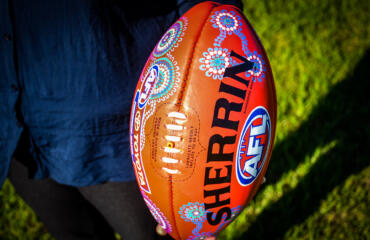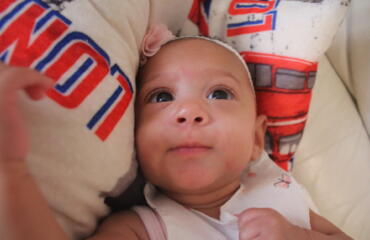“COMPANY – US MOB – WHY?”
The words are scrawled across the bottom of a whiteboard in the Tiwi Bombers’ changing rooms at Norbuilt Oval, 30 kilometres south of Darwin. The underdogs are preparing to play the second-placed Southern Crocs.
Overhead, rusty fans aren’t coping with the heavy January air. The benches creak, the showers leak. A small speaker pumps out upbeat saltwater R&B by a seven-piece outfit called B2M, which stands for “Bathurst to Melville”, the two main islands that make up the Tiwis.

Tiwi Bombers coach Brenton Toy
While the rest of the country fixates on tennis and cricket, Territorians fixate on footy. The Northern Territory Football League (NTFL) runs through the wet season, from October to March, and the Bombers’ finals aspirations are in the balance. They have to win today, and again next week against top-placed Nightcliff, to be a realistic chance.
Coach Brenton Toy cuts the music and the players gather around. Short, bald and spirited, he picks out the words scattered across the board, most drawn from regular footy parlance. Attitude. Effort. Discipline. Spread. Structure
Then he taps his marker on the board twice, drawing all eyes to the words that matter most – “Us Mob”.
“No other club comes close to what we have,” he says. “The whole experience of this club – embrace it … we have a unique environment, and unique relationships.”
He randomly points at players. “My brother, my cuz, my nephew, my cuz, my brother, my nephew…” Football clubs frequently speak of themselves as families. Here, it’s no metaphor.
On today’s team-sheet, there are two Tipungwutis, three Puruntatameris, and two Munkaras. That’s just the brothers. The coach, Toy, the captain, Paddy Heenan, the veteran, Shane “Tippa” Tipuamantmirri, and the team’s newly-recruited runner, four-time Hawthorn premiership player Cyril Rioli Jnr, are all related via their grandmothers.
The Tiwi Bombers were the first all-Indigenous team to play in a major competition when they debuted in the NTFL in 2006, and rarely play more than a couple of outsiders. Most players live out on the islands, which float in the Arafura Sea 80 kilometres north of Darwin.
The island’s population is only around 2500, which makes the Bombers tight knit and special. That sense of closeness is also what made the events that led to the club’s formation so painful.

The Tiwi Bombers players join hands during their clash with the Crocs
In the islanders’ language, the word for Australian rules football is yiloga (pronounced yilowa). There is no word for suicide. The first death recorded as such on the islands was in 1989.
Then, between 1989 and 2008, 44 Tiwi Islanders died by suicide, an analysis by Indigenous health researcher Leonore Hanssens of Charles Darwin University revealed. After reviewing all the coronial reports, Hanssens presented her findings to a Northern Territory Senate inquiry in 2009. She found that 24 of those suicides occurred between 2002 and 2006, many of them in small clusters that left the Tiwi Islands with one of the worst rates of suicide in the world per head of capita. The Sistagirls, a group of transgender Tiwi women, were particularly affected, but the majority of the deaths were of men aged between 18 and 40.
The death rate plummeted in 2007 and 2008, with one suicide in each of those years. That decline aligns with a broad community response that began in 2006 and was documented by the Healing Foundation, an Indigenous health organisation that helps communities deal with trauma. Its report, Stories from Community, released late last year, drew insights from more than 80 community members.
Music and sport, especially via B2M and the Bombers, were recognised by the foundation as important threads in the Tiwi narrative of recovery, because of their usefulness as tools for “engaging young people in stronger lifestyles and choices”.
Nationally, the Indigenous suicide rate has risen from 17.8 deaths per 100,000 people in 2008, to 25.5 deaths per 100,000 people in 2017. Last month, a coronial inquest probing the deaths of 13 Indigenous youths in the Kimberley region within a four-year period concluded. Five of those youths were children aged between 10 and 14, three were aged 16 or 17 and five were aged between 18 and 24. WA state coroner Ros Fogliani said the “profoundly tragic” deaths were “shaped by the crushing effects of intergenerational trauma and poverty upon entire communities”. Senator Pat Dodson told Guardian Australia that Fogliani’s report “must lead a paradigm shift that leads to community-led solutions that address the clear sense of suffering, hopelessness and disillusionment that is being felt”.
The release of the inquest findings closely followed a report from a Senate Inquiry last December, which concluded that Indigenous suicide was at crisis levels, and that the history of dispossession, along with the social and economic conditions in which Indigenous peoples live, were key causes of suicide. In this context, with emphasis being placed on the need for community determined and driven solutions, the Tiwi story – and the place of the Bombers within it – becomes instructive.

Shane “Tippa” Tipuamantmirri is a Bomber’s veteran, and captained the club’s only premiership in 2011/12.
Islanders had long dreamt of a Tiwi team playing in the Darwin-based Northern Territory competition. It was something that Shane “Tippa” Tipuamantmirri hankered for as a high-school student in Darwin in the ‘90s. He’d spend his Friday’s sketching out a team, bringing together Tiwi players whose talents were scattered across other NTFL clubs.
The dream became a part of the community’s suicide response, enlisting the leadership of local legends of the game, among them Cyril Rioli Snr, Matthew Wonaeamirri, and Maurice Rioli Snr.
On his bulging left-arm Tipuamantmirri has a small tattoo of a dragonfly, a tribute to a friend.
“She passed away through depression. And that was her art.”
By the time the Bombers played their trial season in 2006/07, Tipuamantmirri was playing for South Fremantle in the WAFL. He knew he would eventually head home to play alongside his Tiwi brothers. “They felt really proud and honoured to wear a Tiwi Island jumper.”

Tipuamantmirri marks in front of Crocs player, and ex-AFL player, Richard Tambling
After coach Brenton Toy sends his players out to warm-up for the Crocs game, he stands alone in the middle of the changing rooms, inhales deeply, and declares with relish that he can smell rain. Within two minutes, the tin roof is copping a battering. When the players return, drenched, Toy reminds them that they grew up “thriving” in wet conditions, not hiding inside like other boys. Play the percentages. Keep it simple. “Let’s have some fun!”
Several Tiwi players – the Riolis, David Kantilla, and Michael Long, to name but a few – have thrilled crowds in the south. A Catholic missionary posted to Bathurst Island in 1941, Brother John Pye, is credited with introducing Australian Rules to the islands. The legendary “father of football”, who died at 102, described the Tiwi take on the game as “lightning fast” and “almost like a religion”.
It’s another cliche the rings truer for the Tiwis than others. The small population produces eight teams for its local league, and two junior girls’ side which compete in Darwin under the Bombers’ name. That means well over a third of the population is playing competitive football.
Yiloga best translates as “your football”. There’s individuality bound up in in the word. It’s not “the game as it should be played”, but the game played in your own unique way.

Harley Puruntatameri goes on a long run along the wing of Norbuilt Oval
By three-quarter time, the underdog Bombers are beating the Crocs, capitalising on the chaos of the heavy rain. Former West Coast Eagle Ashton Hams, the only whitefella in today’s team, describes the Tiwi style as “tap-tap footy”, a reference to their habit of knocking the ball along the ground before picking it up. Where other sides might try to pick lace out passes onto a teammate’s chest, the Bombers kick wide, out into the space on the wings, so they can run onto the ball and explode away from their opponents. It’s thrilling to watch.
The match is sealed in the final term by a goal from former Melbourne Demon Austin “Ossie’ Wonaeamirri, and the Bombers run out 22-point winners. Their finals aspirations are alive, but hinge on next week’s game against Nightcliff.
In the rooms, players and staff form a circle to sing the club’s song, Japparika (embedded below). Hams does his best to sing the Tiwi verses, covering the blanks with loud cries of “ayyyy”.

The Bombers leave Norbuilt Oval after their win over the Crocs. In the middle, Ashton Hams smiles broadly, while Aaron Daniels has his arm aloft.
The Tiwi traded with the Macassan people from Sulawesi long before Europeans arrived in Australia. Bombers captain Paddy Heenan thinks it’s the Macassan vessels, not the Dutch or British ships, that inspired his totem – a sailing boat.
The Dutch landed on the islands briefly in 1636, but saw no one. In 1705, three Dutch ships encountered Tiwi men, shooting one dead. The British built an outpost near Pirlangimpi in 1824, but soon abandoned it. It wasn’t until 1911, when the Catholic mission was established, that Tiwi culture was truly threatened.
Researcher Leonore Hanssens outlines another clear chronology of events that reshaped life on the islands – the introduction of alcohol in the ’70s and ganja (cannabis) in the ‘80s; a spike in family violence and suicidal behaviour; and then the first recorded suicide in 1989.
The Healing Foundation’s report also points to grog and ganja, along with gambling, as primary reasons for “suicide ideation and attempts”.
In the wake of the emergency, the Tiwi Land Council banned full-strength beer at all social clubs. Patrons had a four-drinks daily limit, with no take-aways. Mandatory alcohol-free days became commonplace. These measures, recognised in Hanssens’ research as crucial to the effectiveness of the response, remain in place. Their introduction coincided with a crackdown on black market grog and ganja.
“When we talk about living with alcohol, that is the right recipe, if people can’t get addicted … It’s a physiological condition,” she says.
But there were many other grassroots dimensions to the response. The Healing Foundation highlights the regular meetings convened within the traditional Tiwi skin groups – Takaringuwi (Mullet), Miyartuwi (Pandanus), Lorrula (Stone), and Warntarringuwi (Sun).
These gatherings allowed the community to develop long and short-term approaches, and to talk about underlying issues, including intergenerational trauma. They provided opportunities for people to access mental health and suicide prevention workshops. There was also significant bolstering of the mental health workforce, which was burnt out by 2006.
These factors meant that the community was better equipped to deal with future suicides, and to prevent clustering. Hanssens’ work shows that clustering was a major part of the emergency on the islands, as it has been recently in the Kimberleys.
“The Tiwi people are a close-knit community in every sense of the word … the suicide clustering and contagion effect starts to become more overt in tight knit communities.”
Then, there was the formation of the Bombers, which “became a big part of the community”, the Healing Foundation observed. Sport and music provided “places and spaces for cultural knowledge to be shared, and where culture could work”.

Bombers skipper Paddy Heenan surveys his options on the wing during the Bombers clash with Nightcliff
Paddy Heenan, the Bombers’ captain, grew up understanding his culture and heritage, and wants the same for his two-year-old, Keith.
“I know my identity. I know where I belong, and where I’m from. I know my dance … Having my little one, I wanna be able to teach him everything I was taught as a young fella … Hopefully he’ll grow up being disciplined about things, and respectful.”
The Healing Foundation’s report confirms that suicide rates have fallen dramatically, largely crediting the organic community response. But the numbers over the past decade are not specified. The National Coronial Information Centre will not release location-specific data for the years 2008 to 2018 because the low number of cases means there’s a risk of victims being identified.
There is no room for complacency around what has been achieved. Tiwis are identified by research as being at high risk, and the Healing Foundation’s report says that people “know that the islands are not incubated or immune from future suicides”. In October, just before the season started, the Bombers lost a player to suicide.
Coach Brenton Toy says that “the first reaction from everybody was shock. I think it reminded the group that nothing is guaranteed, and that we need to make the most of every moment.”
After the initial period of mourning was over, the conversations within the club changed to focus on avoiding recurrences. “The boys rallied together and chatted about what had happened and made sure that everybody else had the appropriate support if they were feeling that way. And they had a chat about the impact it has on others and dug deep around the broader impact that something like that has.”
The Bombers started the season with five losses, and Toy says the passing of their mate was one of several factors that led to that poor start. “I think subconsciously there was a weight we were carrying around that took us a while to off-load.” The tragedy left him “rocked”
Toy is a proud Tiwi. His grandmother, Frieda Williams, hails from Pirlangimpi. He grew up in Darwin, and first visited her place when he was 11. He passed by an old lady who instantly recognised him.
“You. You’re Frieda’s grandson,” she said. It was a statement, not a question.
Toy was general manager, and an assistant coach, during the Bomber’s first full NTFL season in 2007/08. He observed the initial community reaction to suicide, and football’s place within in.
“I think there’s probably too much going on to say that footy is the one thing … but it’s had a good impact on individual lives, and then generally in the community, I think it’s been a positive,” he says.

Simon Munkara, Michael Cooper and Austin Wonaeamirri embrace after a last-quarter goal against the Crocs
He talks about the different “themes” the Bombers discuss and work though each season, and how they help the players become community role models.
“The majority of our boys have got all kids, so we said, ‘Okay, what does it mean to be a good Dad?’ I need to be there for my family, and look after them. That’s the same thing as looking after your teammates … we just drew these comparisons … being a good dad good also means being a good husband. We really tried to drill down into the individual and how our behaviours shape and affect others.
“I had guys that were sending me photos at night time laying in bed with their kids reading a book. And it had nothing to do with footy. They wanted to show me that they were being good parents and being good dads because that’s what our theme was.”
After time coaching elsewhere, Toy returned to the club for the 2017/18 season. Despite the Bombers success on the ground – including a premiership – and its contribution to the community, financial troubles put its future in serious doubt.
Running a team of island dwellers in a mainland competition is an expensive business – up to $500,000 a year, much of it spent on transport and hotels. An economic downturn on the islands meant local businesses were finding it harder to support the club. By February 2017, the Bombers owed the NTFL around $12,000.
AFL club Essendon kicked up its support to help get the Tiwi team back on solid ground. With a reinvigorated list of sponsors and the debt paid off, the Bombers’ future now looks more assured.
While many questioned the Bombers’ long-term viability, Allan McGill – a whitefella who worked on the islands for 40 years, and one of only two Bombers life members – says he was always confident the club would pull through. “We would never have lost it. Someone would have come up with some cash to help,” he says.
“It’s a team to represent all the Tiwis. Tiwi means one people, that’s what it stands for … it’s their team, to compete in Darwin.”
Toy had conversations with several key Bombers’ players before returning to the club. They told him how much the club meant to them, their parents, their grandparents. But the coach says what lured him back was his desire to succeed. “You want to take a group from one place to another. You want to win.”
His most pressing problem right now is figuring out how to do that against Nightcliff on Sunday without Aaron Daniels, a regular ruck option. Tiwis are not tall, which helps them in the wet, but it also means they get routinely thumped in the hit outs.

Ex-AFL player Nathan Djerrkura watches on during the Bombers clash with Nightcliff
Dr Gary Robinson, another Indigenous health researcher at Charles Darwin University, was 13 when he saw his first Tiwi footballer in action. It was in Adelaide, at the South Australian league’s 1964 grand final. He snagged the autograph of the first Tiwi Islander to play in any southern competition, David Kantilla. Atypically big at 196 centimetres, the ruck rover was best on ground as his side, South Adelaide, beat Port Adelaide.
It’s no coincidence given his history of research and health promotion on the islands that Robinson has maintained a keen interest in the Tiwi game. So what are his observations about the strength of the connection between the rise of the Bombers and the reduction in suicide numbers on the islands?
“I’m happy to say football – whether it’s young women, whether it’s young men, or the Bombers – is part of it. It’s part of what provides opportunities and helps people deal with things.
“I think sport is important in giving young people pathways … it’s good, but in terms of suicide and self-harm and all those things, it’s not a magic bullet,” he says.
Robinson also says that there are lessons in the Tiwi response that can be applicable elsewhere, especially in the Kimberley, though the most at-risk there are teenagers and youths, rather than adult males. There is a model to be found in the Tiwi experience – albeit a complex one enlisting community ownership, the use of traditional ways, appropriate legislation, better health services, and other elements, like sport and music.
He adds the caveat that there is no one-size-fits all, with each community requiring a tailored approach if responses are to be effective.
“You’ve got to approach it by engaging and mobilising people in each place – families, elders, services, and so on. That will depend on the specific set of circumstances.”

As the Bombers play Nightcliff, Adam Tipungwuti – an AFL hopeful and the cousin of Essendon’s Anthony McDonald-Tipungwuti – runs the drinks. He was a late withdrawal from the match because of a shoulder injury, but Brenton Toy thinks he actually dropped out because he wanted Jack Munkara to play in the 200th game of his older brother, Simon.
In the rooms before the crucial clash against Nightcliff, Toy gives his players a final rev up. “We come in from OUR country, in OUR jumper,” he bellows.
Bomber Simon Munkara carries one of his children, and shepherds another three, as he leads his team out onto the ground through a guard of honour. His mother, Alice, walks with them through a banner celebrating the veteran’s 200th NTFL game.
He’s the first Tiwi to achieve the feat, which has meant over 32,000 kilometres of travel – enough to circumnavigate Australia, twice. His brothers, Jack and Dion, are in the Bombers’ side. His wife, Helena, and his father, Danny, have travelled onto the mainland for the match.

Dion Munkara is known for his exuberant celebrations…
As the Bombers fight for their season in intermittent rain, the brothers Munkara are entertaining combatants. One minute, Dion is kicking a goal and banging his heart in celebration. The next, he’s playfully pulling his opponent’s man bun. Simon kicks a trio of goals, nudging the Bombers in front in the third-quarter.
Toy has found no solution to his ruck headache, and the Bombers are thumped there all day. Nonetheless, they look like they have the game won early in the last term, ahead by 16 points. Then, they tire. With each Nightcliff goal, the roar of a tiger rings out over the crackly PA at the ground. Eventually, the roar has sounded often enough for the home side to hold a five-point lead, with only moments to go.
The game ends up in the hands of the Bombers’ talismanic forward, Ross Tungatalum, 20 metres out from goal. He can seal it himself, but he chooses to handball over the top of Nightcliff’s Jonathan Peris, to teammate Michael Cooper in the goal square.

And for occasionally playing the rascal.
Cooper slips on the soft ground and drops the the ball as it arrives. Peris closes on him, then slips himself. An epic encounter finishes with a piece of comedy. Cooper and Peris flap around in the goal square like dying fish. Peris throw a fist at the ball to try and rush it through for a behind, but instead, hits thin air.
The ball rolls into the path of Tungatalum, who shanks his soccer kick. It sneaks through for the goal that puts the Bombers well and truly back in the premiership race.
Soon, Toy will tell a packed changing room how proud he is of Simon Munkara, not just as footballer, but as a father and as a role model.
But first, on the oval, the players, the Munkara family and the other Bombers supporters form a circle with Simon in the middle. As the circle claps in unison, his mother, Alice, dances slowly out from the crowd. When she reaches her eldest son, the rhythmic clapping turns into applause as mother and son embrace.
The Bombers won two of their last three games to finish third in the NTFL, thereby securing an unlikely double chance in the finals. They need to win next Saturday in a knockout preliminary final against the Southern Crocs to make the grand final at TIO Stadium on Saturday, March 16.
Continue to parts two and three of this series here.
A version of this story was published via The Guardian. Travel and research was supported by funding from the Melbourne Press Club’s Michael Gordon Fellowship program.
Crisis support services can be reached 24 hours a day: Lifeline 13 11 14; Suicide Call Back Service 1300 659 467; Kids Helpline 1800 55 1800; MensLine Australia 1300 78 99 78; Beyond Blue 1300 22 4636. Hotlines in other countries can be found here.

Brenton Toy and Bombers players celebrate after the final siren




